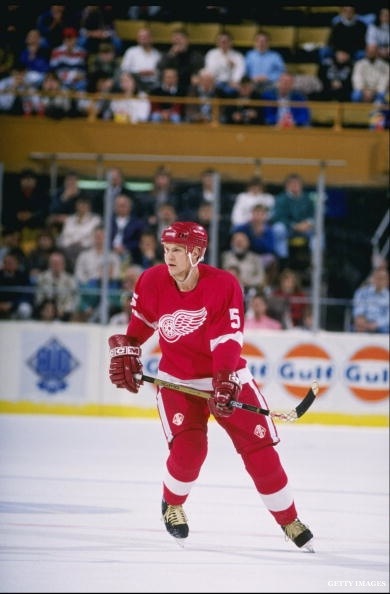
The man they lovingly called Beast took a gamble on himself. It was the kind of decision all of us ponder at one point in our lives but very few of us have the guts to carry out. Brad McCrimmon wanted to be an NHL head coach, and he would leave the bench of the Detroit Red Wings for one of the coldest parts of the planet to do it. He was known as a stay-at-home defenseman during an 18-year career that spanned more than 1,200 games, but that's the kind of lazy label that belied the willingness of the man to venture to a new place to make himself better.
Brad McCrimmon never got to find out if his big chance would come. He was among the dead in Wednesday's plane crash near Yaroslavl, Russia. His new team, Lokomotiv of the KHL, nearly all lost their lives. He died with them. He never coached a single regular-season game.
But don't think McCrimmon's legacy is wanting. It's already written not only in the careers of the few he got to coach as an NHL assistant, but in the many he got to mentor as a teammate. It's appropriate that one of the first to speak about McCrimmon was someone who met him at a very vulnerable time in his career. That someone turned out to be one of the best defensemen ever to play the game.
"Beast I've known for a long time," said Red Wings captain Nicklas Lidstrom Wednesday morning in a quickly arranged press meeting in Detroit. "He was my (defensive) partner my first year in the league over here and he was my roommate too so I got to know him real well. He helped me out a lot my first year over here."
It's hard to imagine Lidstrom as anything but a giant in hockey. But he was nothing of the sort when he was drafted by Detroit in 1989. He was skinny, almost frail, to the point that Red Wings brass had serious concerns about his durability. It was no coincidence that he got paired with McCrimmon, the tough-nosed 200-pounder from Saskatchewan who helped the Calgary Flames win their only Stanley Cup the year Lidstrom was drafted. On the ice, the two were complete opposites, almost comically so.

"He was more of a stay-at-home defenseman so that gave me the opportunity to jump up in the play and be a part of the offense," Lidstrom said Wednesday morning. "He was my partner every game in my rookie year and he was a stable, steady defenseman. He also protected me in certain situations when things got a little heated so he was a great partner to have."
Imagine the relief Lidstrom felt knowing he could make rookie mistakes and Beast would be back there every single time to bail him out. Lidstrom learned to excel on all parts of the ice in part because McCrimmon allowed him to roam. It wasn't just Lidstrom, either. Throughout his career in Boston, Hartford, Philadelphia, Calgary and Detroit, McCrimmon was paired with the likes of Ray Bourque, Paul Coffey and Chris Pronger. All of those guys, like Lidstrom, mastered the art of creating time and space on the ice.
But that time and space was earned because of the stability and sweat of McCrimmon, whose plus-minus was positive from 1980-81 to 1992-93 and an incredible plus-83 in Philadelphia in 1985-86. He is still owns the eighth-best career plus-minus in league history, a staggering fact considering he rarely scored a point of his own. But in a way, that was how McCrimmon lived and died -- trying to help younger players make plays, take chances, and grow.
Red Wings coach Mike Babcock visited McCrimmon's home Wednesday morning when he heard the horrible news. No one was there. It's heartbreaking to imagine what it will be like for McCrimmon's wife and two kids to return there. But if there's any solace for them, it’s this: The stay-at-home defenseman left home to do what he loved -- teach and coach. He's not coming back. But considering the way he lived his life and forged his career, Brad McCrimmon's daughter, Carlin, and son, Liam, already have what they need to go far out into the world, chase after their dreams, and build a future for those who will come after them.
(Photos by Getty Images)




